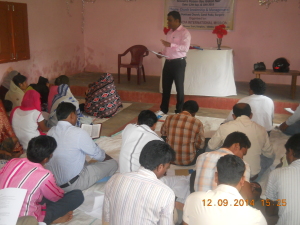In the Bible, God clearly states that we, as His creation, “are to have no other gods before Him” (Exodus 20:3). This is the first of the Ten Commandments and sets forth the foundation of our relationship with Almighty God. God desires that we worship Him alone and submit our lives to Him. But throughout history man continues to place other things above God in their lives. Perhaps the most common idol man worships is himself and his own will instead of God’s will. And this is where we get off track and begin to derail ourselves from God’s plan for our lives.
God gave us free will to choose Him and He does not force anyone to believe in Him or submit to Him. Like a loving Father He wants His children to come to Him willfully and gladly. He sets before us blessings and curses (Deuteronomy 30:19) and wants us to choose Him so that we may live and be blessed (Deuteronomy 30:16). But when we choose our own way instead of God’s way we not only ignore God but we also put our lives in peril.
In America today, many of our social problems and conflicts can be traced back to the same thing – people wanting to do what they want, what pleases them or what makes them happy. They have placed their own personal choices above God. Our culture calls this tolerance. God calls this sin. Why do you think the church and Christianity have come under attack in America? Is it because Christians are intolerant? No. It is because God stands in the way of man’s desire to justify their personal choices. If God does not exist then man can do what it wants. We can’t have it both ways. Either we submit to our own will or God’s will. So, for example, in order for man to endorse abortion God must be eliminated from the discussion or at least made irrelevant. The same goes for homosexuality and gay marriage. So endorsing tolerance of these sins is a direct frontal attack on God. It is because God’s Word is the only thing that stands against man doing what he wants.
And who do you think is behind this? It is satan, of course! From the beginning he has been a liar and deceiver and continues to tell people that they don’t need God and that they can be their own god. He convinced Eve to eat of the fruit of the forbidden tree so that by eating it “she will be like God, knowing good and evil.” (Genesis 3:5) He continually encourages man to deny God, do what pleases man, so that they can become like God. As Ecclesiastes 1:9 says, “What has been will be again, what has been done will be done again; there is nothing new under the sun.” This has been satan’s game plan from the beginning, and apparently it still works today!
Today, we have the same choice – to serve God and do what He says, or serve ourselves and do what we want. It comes down to God or Me? God is good and wants to bless all people (“Taste and see that the Lord is good; blessed is the man who takes refuge in Him” – Psalms 34:8). Man is sinful (“For all have sinned and fall short of the glory of God” – Romans 3:23) and our ways lead to our destruction (“There is a way that seems right to a man, but in the end it leads to death” – Proverbs 14:12).
Who do you choose, God or Me?
I want to be blessed, so I choose God! I pray that you do too!














